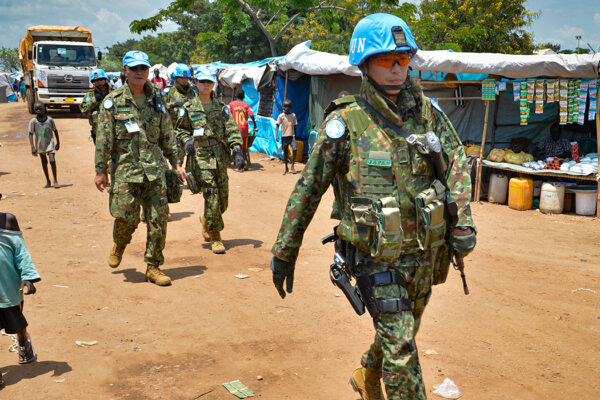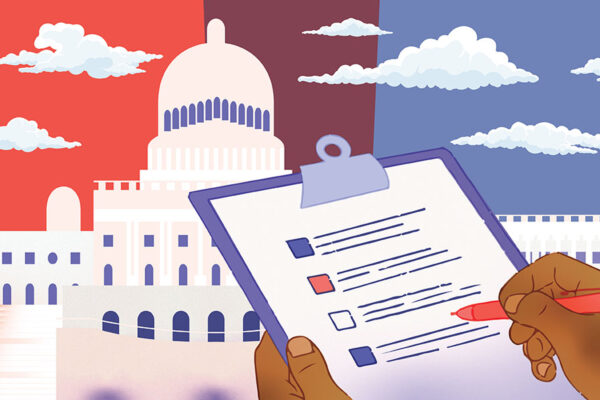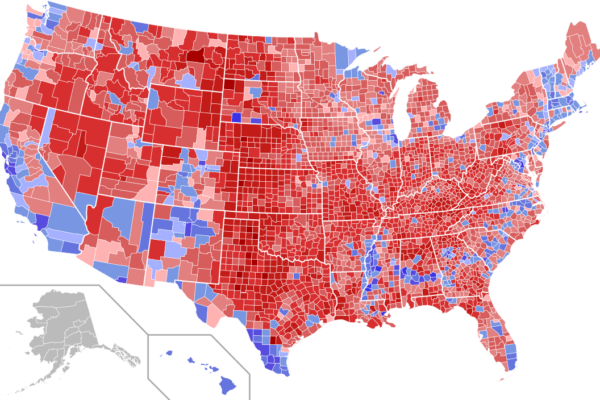Over the past few weeks, the Taliban has quickly taken control of major cities throughout Afghanistan, unraveling 20 years of efforts under United States occupation. Fear and uncertainty only intensified after the Taliban installed themselves in the presidential palace in Kabul on Aug. 15.

William Nomikos, assistant professor of political science in Arts & Sciences at Washington University in St. Louis, is an expert on violent extremism, civil war, international conflicts and peacekeeping. His most recent research has looked at post-conflict power-sharing agreements and factors that increase the likelihood of success as well as at UN peacekeeping efforts. He also has studied the political costs associated with long international conflicts.
Below, Nomikos offers his perspective on the evolving situation in Afghanistan and why, for political reasons, it’s unlikely the U.S. or the international community will intervene.
Why have things escalated so quickly in Afghanistan?
There are three factors at play here.
First, preparation: The Taliban has been preparing for this offensive for years. In the peace agreement that the Taliban reached with the United States under the Trump administration, they consented not to attack major population centers (cities) and American troops. But they immediately started seizing territory in the peripheries of the country. Those seizures laid the groundwork for what is happening today.
Second, the Afghan government in Kabul is not very popular and doesn’t have the support of critical populations, militias and warlords in the country. This is especially true in the north, which for decades has been a stronghold of anti-Taliban resistance. The government under President Ashraf Ghani, worried about internal competition from powerful northern warlords, has worked systematically to undermine local leaders in the north, throwing much of the region into chaos. The Taliban took advantage and moved into the north, which is a huge psychological blow to Afghans resisting the Taliban.
Finally, the U.S. withdrawal left the Afghan forces overmatched against the Taliban, giving the Taliban little incentive to stick to their agreement. The international community was hoping that a power-sharing agreement between Kabul and the Taliban could succeed. But this was naïve and largely misguided. Decades of research in political science has shown that the continued presence of international actors is necessary to make power-sharing happen. Recently, I published a study of 186 power-sharing agreements made since the end of World War II that shows that the likelihood of a power-sharing institution coming about increases exponentially when international actors are present.
Is there anything the U.S. and international community should have done, or can do now, to repel a Taliban takeover?
Despite decades of U.S. training and resources going into state-building in Afghanistan, it’s pretty clear that none of this was sufficient. This is probably due to the inconsistent pressure applied on the Afghan government to commit serious political reforms. Secretary of State John Kerry negotiated a power-sharing deal between Ghani and Abdullah Abdullah, a leader from the north, following a contentious election in 2014. But there was very little follow-up from the United States or various international partners, leading to another disastrous election in 2019. The Trump administration, eager to sign the peace agreement with the Taliban and withdraw, did little to sustain political pressure on Ghani, who was re-elected, during this period.
At this point, there is probably very little that the international community can do short of sending a small expeditionary force — around 3,000-5,000 troops — into Kabul to prevent a humanitarian catastrophe. But then, as now, the question will be whether those forces will remain and, if not, what the exit strategy is. And a UN-led peacekeeping effort to safeguard civilians in Kabul is unlikely given that China and Russia would both veto the operation.
This is a horrifying catastrophe for the Afghan people. There are no good options here. The best that we can hope for is, sadly, that the inevitable fighting in big cities does not rise to genocidal proportions.
Based on your research, why isn’t President Biden or the international community doing more to keep the peace?
It’s evident that President Biden has very little appetite for a long intervention in Afghanistan. During the presidential campaign, he made it clear that he would withdraw U.S. troops, pointing to his long-standing opposition to the continued U.S. presence there. He was one of the chief Obama advisers to advocate against the surge in troops in 2009-10.
Indeed, in research I’ve conducted on troop contributions to the war in Afghanistan, I’ve found that contributors to the war effort, including the United States, withdrew around 10% of their forces whenever they were up for re-election. Even at the height of the war, the U.S. and its allies tried to avoid the electoral consequences of the war.
William Nomikos
There is also a broader point here. The U.S. effort in Afghanistan has been tied to electoral politics for a long time. We tend to associate wars with “rally-around-the-flag” effects where presidents and their party get popularity bumps during wars. This may have been true during WWII, but military interventions in the 21st century are long, drawn-out affairs that are political losers. This is due to what I’ve identified in past research as the time inconsistency between costs and benefits of military interventions. The best-case scenario benefits of intervention take decades, sometimes generations to bear fruit. Meanwhile, the costs of intervention accrue immediately, both in terms of actual money as well as human lives. For politicians facing election campaigns, this means that there is just no incentive to pay the costs of war up front when you might never see the benefits.
Indeed, in research I’ve conducted on troop contributions to the war in Afghanistan, I’ve found that contributors to the war effort, including the United States, withdrew around 10% of their forces whenever they were up for re-election. Even at the height of the war, the U.S. and its allies tried to avoid the electoral consequences of the war.
President Biden is focused on getting Congress to pass a $1 trillion infrastructure bill and a $3.5 trillion budget reconciliation bill that, together, would comprise much of his first-term agenda. Biden has calculated that he needs to invest all of his political capital in maintaining the existing coalitions to pass these two bills, not a new war effort. According to estimates, the war in Afghanistan alone has already cost American taxpayers more than $2.2 trillion.
Simply put, Afghanistan is a loser at the ballot box. As I’ve shown in my research, voters care about whether the president makes the right policy, not whether American forces remain deployed abroad to maintain their reputation. President Biden is making that exact calculation here. It also seems like the Biden administration has also calculated that whatever humanitarian disaster might unfold, it’s not worth the risk of intervention. This is probably a good bet. Humanitarian disasters quickly disappear from headlines with few political consequences. Syria is a case in point. And Biden might have learned from the Obama administration’s non-intervention there that there are very few electoral costs of not intervening in a civil war.



